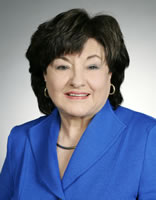In order to provide equal access and equal opportunity to people with diverse abilities, this site has been designed with accessibility in mind. Click here to view
Easley’s Bill to Protect Children Signed into Law
 Sen. Mary Easley
Sen. Mary Easley
A bill strengthening penalties against parents caught driving drunk with their children in the vehicle has become law. Sen. Mary Easley is the Senate principal author of SB 1138 which amends the definition of child endangerment to include parents or guardians knowingly letting their children ride in vehicles operated by people who are under the influence of drugs or alcohol.
“It seems like commonsense that parents wouldn’t risk the health of their kids by driving around drunk with them in the car or letting them ride with others that were, but unfortunately not everyone makes responsible choices,” said Easley, D-Tulsa. “We must protect our youngest citizens by strengthening our laws on child endangerment to help stop or at least deter this type of dangerous behavior, while at the same time holding these adults responsible.”
SB 1138 was a request bill from Mothers Against Drunk Driving (MADD), which found that 68 percent of the children who died in alcohol-related crashes between 1997 and 2002 were riding with an adult who had a median Blood Alcohol Content (BAC) of .13. Of those adults involved, 68 percent survived, but the children were killed.
Under the new law, which became effective immediately when the Governor signed it, any driver over the age of 18 who is found to have a minor in the vehicle while being under the influence of drugs or alcohol will be guilty of child endangerment by DUI. Those convicted will face double the amount of the fine imposed for the underlying DUI violation.
Any parent or guardian found under the influence of drugs or alcohol with their child in the car will be guilty of felony child endangerment, which is punishable with up to four years imprisonment, a fine of $5,000 or both.
SB 1138 also provides an affirmative defense to a contempt of court proceeding in a divorce or custody action for any person who refuses to allow his or her child to be transported by an intoxicated driver.
 Oklahoma Senate
Oklahoma Senate

